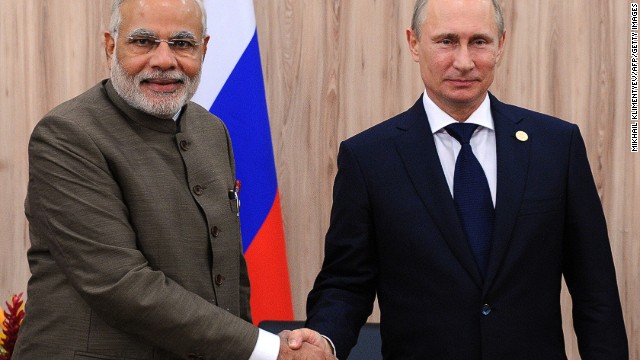

December 10, 2014 -- Updated 1536 GMT (2336 HKT)

India's PM Narendra Modi meets Russia's President Vladimir Putin at the BRICS group leaders summit in Brazil, on July 16, 2014.
STORY HIGHLIGHTS
- India sits uncomfortably between Russia and U.S., writes CNN's Ravi Agrawal
- Agrawal: Narendra Modi told CNN he saw a changed world order
- "Every country is trying to build relations with other countries," Modi said
- During Putin's visit, it's worth focusing on the outcomes and deals struck, says Agrawal
(CNN) -- In the space of six weeks, with great displays of importance, India's capital will have hosted two world leaders who no longer speak with each other: the presidents of Russia and the United States.
India sits uncomfortably between these two adversaries. Pick your geopolitical topic -- Syria, Iran, Ukraine -- and you can be sure that Moscow and Washington will be at odds with each other. New Delhi has been watching from afar, sitting on the fence.
It is fair to ask if India's stance is sustainable. Can you simultaneously court close friendships with two states whose foreign policies are designed to hurt the other?
READ: The man of the millennium?
In Narendra Modi¹s worldview, the answer is a resounding yes. When CNN spoke with the Indian Prime Minister earlier this year, in his only interview since assuming office, Modi explained how he saw a changed world order.
"If you look closely, you will see that every country is trying to build relations with other countries," he said. They may be part of one bloc, but they also sit with fierce opponents.
When pushed specifically on Russia's annexation of Crimea, a hostile takeover New Delhi refused to condemn, Modi pushed right back. "In the world right now, a lot of people want to give advice. But look within them, and they too have sinned in some way."
The comment could be seen as a subtle dig at Washington's foreign policy missteps. However, Modi's point was not to admonish the U.S., but to suggest that all nations have their own value systems and perceived flaws.
India¹s way of navigating flawed global players was by making friendships and opening channels of opportunity.
READ: Opinion: Why Modi visit crucial for U.S., India, world
The subtext to this is simple: economics. The reason why Modi has traveled all over the world in his first few months in office -- Rio, New York, Tokyo, Sydney -- is not because he wants to be a foreign policy leader; Modi wants to bring business to India.
So: as you read about and see images of Vladimir Putin¹s grand reception in New Delhi this week, keep an eye not on the rhetoric, but the outcomes and deals struck. Russia is the world's second largest exporter of arms; India is the world's biggest importer. Russia is one of the world's biggest producers of oil and gas; India is one of the biggest consumers.
The two sustain each others' needs. And as long as they do, they will court each other, with the United States watching on.






 Add Category
Add Category